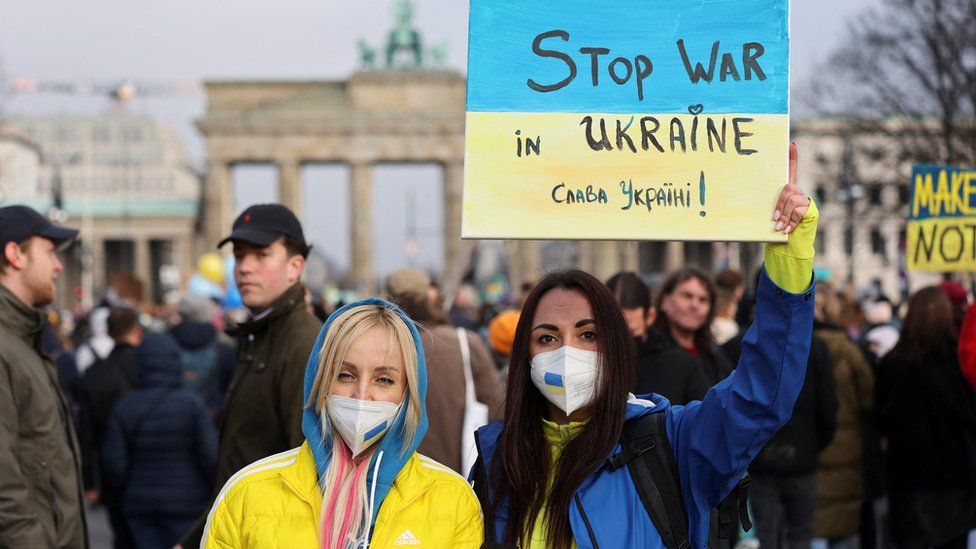Germany has just witnessed a truly historic day. Chancellor Olaf Scholz only came to power in December, but within 24 hours he has transformed modern Germany’s foreign policy.
During an emergency parliamentary session on Ukraine on Sunday, Chancellor Scholz announced an additional $113bn (£84bn) for the German army.
There was an audible ripple of shock in parliament. Some MPs clapped, some booed, others looked stunned.
Undeterred, Mr Scholz went on to announce drastic measures that would have been unthinkable a week ago, including a constitutional commitment to Nato’s military spending target of 2% of GDP – and he confirmed that Germany would be sending weapons direct to Ukraine.
Within a few days Vladimir Putin has managed to do what Nato allies have spent years trying to achieve: a massive increase of military spending in Germany.
This is arguably one of the biggest shifts ever seen in Germany’s post-war foreign policy.
 IMAGE SOURCE,REUTERS
IMAGE SOURCE,REUTERSBefore Thursday’s invasion of Ukraine, such a militaristic stance would have been unacceptable for most Germans.
Traditionally Berlin focuses on diplomacy and dialogue, not military might, and historically there are deep economic and cultural links between Russia and Germany.
Many Germans have a fondness for Russia and a fascination for its culture. So the political debate about Russia has always been diverse and nuanced, with many in Germany willing to at least attempt to understand Moscow’s view.
But Russia’s invasion of Ukraine has shocked and stunned Germany’s government and German voters.

Pro-Moscow personalities, such as former SPD chancellor and Russian energy lobbyist Gerhard Schröder, are seen as toxic. Politicians who a week ago were still expressing understanding for President Putin’s arguments over Ukraine, such as prominent left-winger Sahra Wagenknecht, now say they were wrong.
Support for the Russian people is undiminished. MPs in parliament on Sunday gave a long, standing ovation when Mr Scholz praised Russian anti-war protesters for their bravery. But “Putin’s war”, as it’s now called in Germany, has destroyed any lingering sympathy for the Kremlin.
Germany’s dramatic foreign policy turnaround is all the more remarkable given the three parties in this governing coalition. The personalities running Germany’s government are far from hawkish Cold War warriors who relish the idea of a hike in military spending.
 IMAGE SOURCE,REUTERS
IMAGE SOURCE,REUTERSThe centre-left Social Democrat SPD traditionally has a core belief in the power of dialogue with Russia.
This is a party with a sometimes nostalgic fondness for Russia, and with a deep belief that dogged Cold War diplomacy rather than military threats brought down the Berlin Wall and enabled German reunification.
The Green Party defines itself as pacifist, and has its roots in the West German peace movements of the 1960s and 1970s. The liberal FDP is pro-business, and keen on sinking taxes and spending and boosting trade and economic growth.
Yet it was an SPD chancellor, Olaf Scholz, who declared on Sunday that Germany had reached a dead end in dealing with Moscow, and announced the most hawkish approach to Russia Germany has ever known.
A Green foreign minister, Annalena Baerbock, confirmed in parliament that Germany would indeed be sending weapons to Ukraine. And a liberal finance minister, Christian Lindner, told MPs that the toughest sanctions imaginable were now necessary, even though they would hit the economy hard. “But we are ready to carry the cost because this is the cost of freedom,” Mr Lindner said.
 IMAGE SOURCE,EPA
IMAGE SOURCE,EPAOld political certainties about peacekeeping are being ditched in Germany. Left-wing politicians and many voters are unhappy with higher spending on weapons.
But since the invasion there has been a dawning realisation here that, if successful in Ukraine, Vladimir Putin may not stop there.
So the political mainstream accepts that Germany needs to spend more on its military: to defend Nato allies, but also to defend itself. Suddenly Ukraine feels very near to Berlin.
Critics in Germany and abroad say this realisation comes late. But until this week most German voters and politicians would never have accepted such tough and drastic action.
There would have always been the worry that such a hawkish stance would fuel the conflict. Putin’s war has changed all that.
 IMAGE SOURCE,EPA
IMAGE SOURCE,EPA


